|
RIPSTER REVIVALS #16
An irritatingly frequent ‘occasional’ column of ramblings around the world of (mostly)crime fiction and thrillers which begs the question: what’s the difference between Ripster Revivals and the Getting Away With Murder column he used to churn out?
|
The Spies Have It
It is a great honour for my Mr Campion’s Christmas to make the long list for the inaugural Spy Masters Book Prize for best spy novel published in 2024, as run by Aspects of History.com.

I say honour because having seen some of the other books on the long list by some of my favourite authors (damn them!) such as Jane Thynne, Roger Morris and William Boyd, who I would – were I a betting man – expect to see on the short-list in September.
Given the provenance of the prize, the emphasis is on the historical spy story and fortunately my tale is set in December 1962, as the Russians plan an espionage coup in revenge for their climb-down during the Cuban missile crisis. That winter also saw numerous real-life British spy scandals, the release of the first James Bond film, Dr No, and publication of Len Deighton’s mould-breaking The Ipcress File. So, historically speaking, I feel I am in very good company.
Tiger Milk
I had never heard of American author David Garth when I acquired his 1941 thriller Tiger Milk some years ago and apart from the fact that he was born in St Louis in 1908, I know little more about him now. To be honest, I bought Tiger Milk on the flimsiest of pretexts because the title reminded me of my student days fifty years ago, when one of the mainstays of academic life was a strong red wine from Hungary called Bulls’ Blood. Thing was, the marketing men thought it a good idea to bring out a sister white wine and they called it Tiger’s Milk but the problem was it wasn’t very good – in fact it was awful. Fortunately, David Garth’s novel has nothing whatsoever to do with wine.
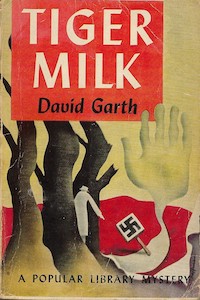
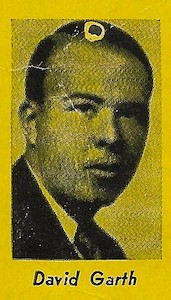
Tiger Milk was first published in January 1941 before America entered WWII, but its tone is anything but neutral. The reader is left in no doubt who the baddies are as a mixed bag of Americans make their way across Spain to Portugal and the Lisbon clipper to the US (their letters of transit being, presumably, in order) as the Nazis take over the rest of Europe.
Along the way, the heroine of the story is recruited to carry a secret warning message (involving an ivory tiger) about a US politician in the pay of the German-American Bund and therefore not to be trusted, whilst picking up a temporary husband who turns out (wouldn’t you know it) to be a stalwart patriot with a family history of duelling and well capable of standing up to the Nazis.
If only because of the date it was published, this is an interesting book and David Garth could certainly write.
Parliamo Italiano
I am continuing my quest to learn Italian one television crime series at a time and the latest is the charming La Legge di Lidia Poët .

Based on the true story of Italy’s first female lawyer, who was awarded her law degree from Turin university in 1881 but only officially recognised as a lawyer in 1920 at the age of 65, The Law According to Lidia Poët is a sumptuous costume drama where the strikingly independent Lidia fights crime and prejudice with equal enthusiasm. The Turin of the 1890s is wonderfully recreated and Lidia, working as an unofficial investigator for her brother’s law firm (because she can’t, being female, be a lawyer) is quick to take advantage of advances in crime-fighting methods, such as fingerprints, and forensics. Naturally, Italian politics and the flourishing anarchist movement of the time add to the pressure on Lidia as she takes on the male-dominated legal establishment.
At the same time, with a quick switch of setting to modern-day Naples, I became hooked on Sara – La Donna Nell’Ombra based, I believe, on a series of books by Italian crime-writing maestro Maurizio Di Giovanni which have not (yet) been published in English.
Sara – ‘the woman in the shadows’ – is one of two female former high-flyers in a shady offshoot of the Italian secret service based in Naples though with constant interference ‘from Rome’. Along with her friend Teresa the pair were known as ‘blonde and brunette’ and tipped for great things but it didn’t quite work out that way. Teresa is still in the intelligence game, though being manipulated by her political masters during an election campaign, whist Sara has quit the spying game and is living ‘in the shadows’. Older, though not necessarily wiser, the two women find themselves working together again and show a remarkable ruthlessness when their private lives are threatened: Sara in the climax of the first episode and Teresa at the conclusion of the last.

Watching both these series on Netflix whetted my appetite for more and so I dedicated several hours to finding Walter Presents, which used to be a bespoke Channel 4 brand, on my not-so-smart television. It was worth the effort as I discovered two more crime series to provide some respite from the unrelenting coverage of Wimbledon and Formula 1 racing.
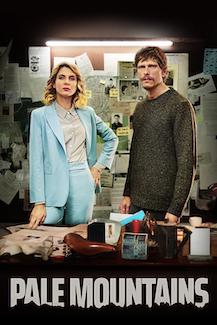

Pale Mountains (or Brennero in Italian) is set in Bolzano and the Southern Tyrol and highlights the historic tensions between the German and Italian-speaking populations. Cold Summer (aka Il Metodo Fenoglio) is set in Bari, in sunnier southern Italy, in the early 1990s as the area becomes the target market for drug-smuggling by the Mafia. The series is based on the character of Carabinieri sergeant Fenoglio, as created by crime novelist Gianrico Carifiglio, who himself was an anti-Mafia prosecutor in Bari, so knows of what he writes. Both Pale Mountains and Cold Summer prove the golden rule of Italian television drama: that all criminal prosecutors are very attractive females.
Confession Time
Back in 2011-12 I edited new editions of David Brierley’s thrillers Cold War and Big Bear, Little Bearas Top Notch Thrillers (both now reissued by Brash Books) and in 2018, David informed me that he had completed a new novel – his first in over a decade – and would I be interested in reading it? Of course I had to say yes, as we were in a bar at the time, though I was slightly mystified at the title: Matt Clough, Bastard.
The basic premise of the novel was that mild-mannered mid-England wine merchant Matthew Clough discovers that his (now dead) biological father was a Latvian, who might have been a British spy. Travelling to Latvia to claim his ‘inheritance’ he discovers that his father, who died mysteriously, might also have spied for the Russians and possibly, during WWII, worked for the Nazis. We then discover that Clough himself had a history of working for British Intelligence.
It was a professional piece of downbeat spy fiction with an unusual setting (Latvia) which showed off all Brierley’s expertise of setting his fiction in off-the-beaten-track locations. I felt, however, that it was too long and advised David to cut 10,000 words from the manuscript – and change the title – before attempting to get it published.

I am not sure how useful David found my advice, but in 2022 I was able to review a thriller set in Latvia, featuring an illegitimate former British spy called Matt Clough. It was published by Safe House Books, was titled Dead Man Telling Tales and was rumoured to be the first part of something called the ‘Dead Hand’ trilogy. Sure enough, a second linked story, set in Hungary (another favourite Brierley hunting ground) appeared as Budapest Hand and this year, the third part of the trilogy set in Tunisia (ditto Brierley hunting grounds) is published as Blue Chalk, Red Blood, White Lightning.
I thought it rather good and it confirmed what I had always known, that Brierley has an Ambler-esque knack when it comes to describing seedy hotels and suspicious policemen. Blue Chalk etc. certainly got five stars from me, but then it really had to as David has dedicated the book to me.
Do Mention The War
The (American) officer of the title in Mark Ellis’ Death of an Officer [Headline Accent] is actually the second murder victim wartime London copper DCI Frank Merlin has to deal with, the first being a respected Indian gynaecologist with a West End practice and, tantalisingly, a possible link to an anti-British Indian nationalist movement. The year is 1943 and wartime restrictions have affected everything except organised crime, which seems to have flourished and Merlin’s investigation into the two connected (?) murders bring him to the attention of local crime gangs – terrifyingly so when his young son is kidnapped just to teach him a lesson.
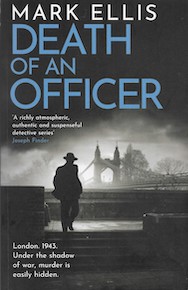
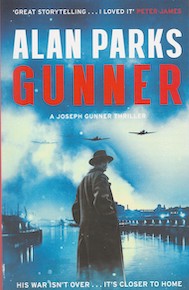
Alan Parks’ wartime detective, Joseph Gunner is a battered Dunkirk survivor dragged back into his former job as a ‘polis’ in Glasgow in 1941. The eponymous hero of Gunner [Baskerville] undergoes several more batterings from local gangsters and possibly the security services (not to mention the Luftwaffe) in the course of investigating the bodies of German prisoners-of-war. Hindered by an elusive conscientious objector brother, Gunner suspects there’s a conspiracy afoot -and of course he’s right and given the time and place, it’s bound to involve the arrival in Scotland of Rudolf Hess. Gunner eventually finds himself making Faustian pacts with both spies and gangsters which may put his soul in jeopardy, but will probably mean we can expect further adventures with this tragic but engaging character.
D-Day Remembered
It was purely coincidental that I discovered in the week of D-Day anniversary celebrations that the one Anthony Price thriller I had never read was Here Be Monsters from 1985. Coincidence, because the book opens with the murder of a US Army Rangers officer at the Pointe du Hoc, the scene of a famous assault by the Rangers during the real D-Day landing.
It was no coincidence that I chose to celebrate my joyous discovery with James Price, son of Anthony, who was kind enough to present me with a first US edition of the book when we met in darkest Soho for our annual catch-up.

On these occasions, James and I tend to set the world of crime fiction to rights. Well, perhaps not the entire world, but certainly that hemisphere which contains hardboiled American noir fiction. Some time ago I introduced James to the works of S.A. Cosby and we spent many a bottle several hours discussing the merits of his latest, King of Ashes, and the legend of Elmore Leonard – and in the process, discovering that we were both big fans of the film and book Mr Majestyk which I remember buying as a Mysterious Press paperback on a visit to the US in 1979.
Titles by Anthony Price and Elmore Leonard are being republished as stylish Penguin Modern Classics (Crime and Espionage) though not (as yet) Here Be Monsters or Mr Majestyk. When I first heard of plans for the Crime and Espionage imprint a few years ago, which seemed to be dedicated to reviving thrillers which did not deserve to be forgotten (my specialist subject on a fantasyMastermind), I wrote to Penguin offering my full support and help promoting the imprint in any way I could.
I received no reply and was subsequently removed from the guest list of the annual Penguin crime fiction party. Coincidence? Probably.
Clash of the Titles
I know there is no copyright on titles but I still could not help doing a double take when I discovered there was another crime novel called Bootlegger’s Daughter published more than thirty years after the one I knew so well.
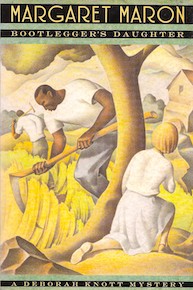
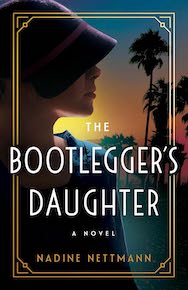
My surprise was not triggered by anything other than a fond memory as the 1992 Bootlegger’s Daughter marked the start of a new series of mysteries by the late Margaret Maron, who was already by then a firm family friend. Her bootlegger’s daughter, attorney (and later judge) Deborah Knott, operating in Margaret’s home state of North Carolina, became the character for which she is best known, although she had penned an earlier, excellent series featuring NYPD female detective Sigrid Harald.
The 2024 title is set in 1927 Los Angeles during Prohibition – hence, plenty of scope for a bootlegger and his/her daughter - is by Nadine Nettmann and is published, I think, by an Amazon imprint. I know little more about the book, but I admit that what caught my eye, apart from the familiar title, was the fact that the author, Ms Nettmann, is a qualified sommelier. I think the lovely Margaret Maron would have approved.
Last Words
I never actually met Frederick Forsyth, who died last month aged 86, though I came close on two occasions and had I done so, I’d like to think I would have thanked him for The Day of the Jackal – not only a thriller of legend, but, as it turned out, a crucial teaching aid in the Creative Crime Writing course I developed for Cambridge University’s adult education department.
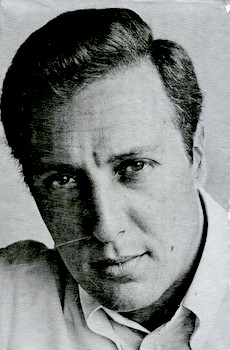
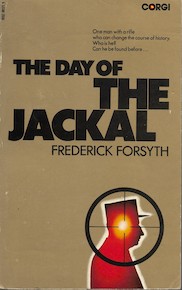
I had been trying to construct a series of building blocks, elements which made up the various aspects of the crime novel or thriller, with basic examples to illustrate the themes of PLOT (eg: Christie), CHARACTER (eg: Sayers), SETTING (eg: Lindsey Davis and Ancient Rome) and so on. One very important building block, especially for the thriller, would be PACE and the example I chose to illustrate this was Day of the Jackal.
My rationale was that the reader knows at the outset that General De Gaulle wasn’t assassinated, but begins to think maybe he was and they’d somehow missed that particular history lesson. Halfway through the book the reader’s convinced it’s going to happen and is almost willing the Jackal to succeed. And all that is down to the pace of the writing.
The book is also the subject of one of my favourite stories about British publishing in that the Hutchinson sales force was said to be split almost to the point of mutiny because they feared the book would not be accepted by bookshops, libraries and readers, as everyone knew De Gaulle had not been assassinated.
Not everyone appreciated Forsyth’s pacy documentary style and the British crime writing establishment declaimed rather haughtily that: Authenticity is to Forsyth what imagination is to many other writers. And even twenty years and dozens of reprints after the initial publication (and film version), the critic Julian Symons was still dismissive, claiming that: Forsyth has no pretension to anything more than journalistic expertise...
Fifty-four years on The Day of the Jackal is still in print and has no doubt gained a new readership thanks to the recent “re-imagined” (extremely re-imagined) television series for Sky. Such newcomers to the novel should expect a much lower body-count, no romantic home life sub-plot and no literary equivalent of those magical words from television – ‘second series’. There will, however, be a sequel to Forsyth’s stunning second thriller The Revenge of Odessa, written in conjunction with Tony Kent, is due to be published in October.
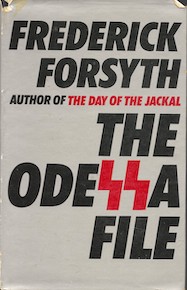
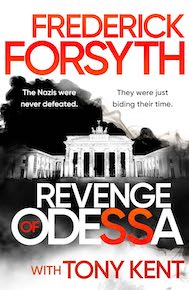
CrimeFest: Any Other Business
At CrimeFest in May, a timetable clash prevented me from attending the (sell-out) session chaired by my fellow comedy panellist Nev Fountain, featuring actor and talented writer (damn him) Mark Gatiss and writer and broadcaster Matthew Sweet talking about the upcoming television series Bookish. The television series, as created by Mark Gatiss, is almost with us and so too is the novel based on it, by Matthew Sweet.
Bookish [Quercus] charts the adventures of a seemingly (but not really) disorganised second-hand bookseller called Gabriel Book (yes, Book’s books can be confusing) in an immediately post-war London. Our hero not only has an interesting personal life and relationship with the woman next door, but is also a dab-hand at solving crimes.
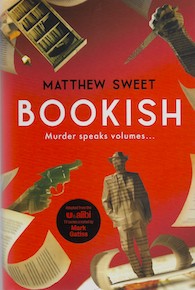
Given Mark Gatiss’ track record in writing for the small screen, I have no doubt that the television series will be a palpable hit. I am also looking forward to the book as I have long admired Matthew Sweet’s radio and television work on the history of famous London hotels and British film studios. I have also given him an award (sight unseen) for his next book (yet to be published) for the best title ever: The Great Dictator – a biography of Barbara Cartland!
Amore e baci,
Il Strappatore